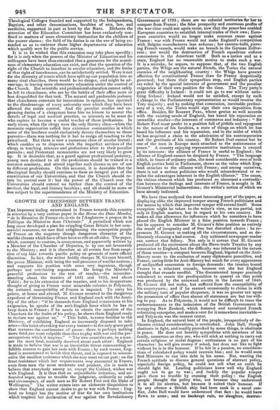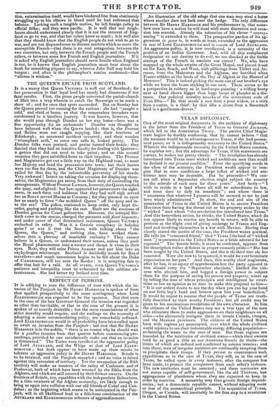GROWTH OF FRIENDSHIP BETWEEN FRANCE AND ENGLAND.
_ T..Jaz,improved feeling entertained in France towards this country is attested by a very curious paper in the Revue des Deus Mendes, "de la Situation de France vis-à-vis de l'Angleterre It propos de la Politique du Ministere dans l'Oceanie." A periodical which not long since developed a plan for crippling Great Britain in her com- mercial resources, we now find enlightening the susceptible people of France on the nugatory though dangerous character of the warlike threats which have of late been so rife on all sides. The paper, which, contrary to custom, is anonymous, and apparently written by a Member of the Chamber of Deputies, is by one not favourable to the Ministry ; and it is therefore at all events free from suspi- cion of any bias towards pacific policy on grounds of mere official discretion. In fact, the writer boldly charges M. Guizo-r himself, the peace Minister, with being the real promoter of warlike notions ; and supports his position with some very ingenious, though perhaps not convincing arguments. He brings the Minister's peaceful professions to the test of results,—the misunder- standing about the treaties of 1831 and 1833, and about Tahiti ; for to his extension of the treaties, and to his inopportune thought of giving to France some miserable colonies in Polynesia, the irritated susceptibility of France is imputed. To carry his points, at home and abroad, M. GI:11E0T resorted to the dangerous expedient of threatening France and England each with the hosti- lity of the other : "if he demands from England concessions to his exigencies, he speaks of the anti-English furor which he has to keep down in France ; if he needs to obtain the sanction of the Chambers for the faults of his policy, he shows them England ready to declare war against us." " This habit, become familiar to the Ministry, of exhibiting England as incessantly disposed to take arms—this habit of evoking war every instant—is the only grave peril that menaces the continuance of peace: there is perhaps nothing more fatal,nor more culpable than thus to play with war and the pre- occupations which it inspires." "The two countries are, in a man - Der the most fatal, mutually deceived about each other : England is made to believe that war is an irresistible threat commanding in- fallible success to gain her ends with France ; by such means, Eng- land is accustomed to lavish that threat, and is exposed to miscon- ceive the smallest resistance which she may meet on our part : on the least resistance which her requirements may encounter in France, even from men the most moderate and prudent, she is made to believe that everybody among us, except the Cabinet, wishes war with England. It is thus that an unjustifiable irritation, and un- founded anger, arise to trouble the judgment, ordinarily so calm and circumspect, of such men as Sir Robert Peel and the Duke of Wellington." The writer enters into an elaborate disquisition to show that England cannot desire to go to war with France : Eng- land no longer has the motive of fear for her own institutions which inspired her declaration of war against the Revolutionary
Government a 1793; there are no colonial territories for her to conquer from France ; the false prosperity and enormous profits of the war-time could not again recur, now that the peace has enabled European countries to establish internal trades of their own; Euro- pean countries would no longer make common cause against France : war with France would not make England's competition with Belgian manufactures less arduous ; her cannon-balls, pierc- ing French vessels, would make no breach in the German Zollve- rein ; nor would the destruction of French squadrons enforce concessions in the American tariff. Both as a nation and as a state, England has no reasonable motive to make such a war. It is a mistake, he argues, to suppose that, of the two English parties, the Whigs are the natural friends, the Tories the natural enemies of the neighbouring country : the Whigs have greater affection for constitutional France than for France despotically governed; but there their sympathies stop, and English parties are ruled by the special interests of government and the peculiar exigencies of their own position for the time. The Tory party's great difficulty is Ireland : it could not go to war without satis- fying Ireland : Ireland would not be satisfied, except by such a change in the Parliamentary representation as would reverse the Tory majority ; and by making that concession, inevitable prelimi- nary of a war, the Tories would sign their own deposition from office. Besides, Sir ROBERT PEEL, whose genius so well accords with the existing needs of England, has based his reputation on unwarlike studies—the interests of commerce and industry : " Sir Robert Peel must prefer to a position full of pitfalls and repugnant to the nature of his faculties, a state of things on which he has based his influence and his reputation, and in the midst of which he has acquired a claim to the admiration of his contemporaries and the gratitude of his country. Sir Robert Peel cannot but be one of the men in Europe most attached to the maintenance of peace." A country enjoying representative institutions is swayed by its interests: the alliance of France is useful to England ; the alliance of England cannot be despised by France. "The language which, in times of ordinary calm, the most considerable men of both English parties hold in Parliament, shows us the value which Eng- land attaches to the alliance with France; and among ourselves, there is not a serious politician who would misunderstand or re- pulse the advantages inherent in the English alliance." The cause, the vicious element which has produced so abnormal a contradic- tion between the feelings and interests of France, is sought in M. GUIZOT'S Ministerial indiscretions; the writer's notion of which we have already indicated.
We have thus analyzed the most interesting part of the paper, as displaying alike the improved temper among French politicians and the means by which that improved temper will extend itself. Some exception might be taken to the writer's view, as too partial, not only in English matters, but in regard to his own country. He makes all due allowance for influences which he considers to have placed the English Minister in a false position towards France ; but he appears to consider M. Guizor's false position as entirely the result of incapacity and of free but distorted choice : he re- presents M. G171ZOT as making all the circumstances, and as de- liberately choosing a bad course. Any unbiassed newspaper-reader can correct that fallacy. Not only is it untrue that M. GU1ZOT produced all the excitement about the Slave-trade Treaties by any concession to England, but the difficulty was inherent in the nature of those treaties—a compact between England, bigoted on the Anti- Slavery score to the exclusion of many diplomatic punctilios, and France, caring little for Anti-Slavery but much for every appearance of undignified concession to foreign demands : the treaties bound France to a reluctant crusade, because not she but England thought that crusade needful. The discontented temper precisely calculated to create the predisposition to quarrel on that point was produced by the untoward events in the Levant of 1840. M. Guizox did not make, but suffered from the susceptibility of his countrymen ; and if he seemed occasionally to chime in with the military turn of popular eloquence, it was no greater tax upon the possession of office than almost all statesmen are but too will- ing to pay. As to Polynesia, it would not be difficult to trace the embarrassments to the indecision of the British Government in occupying New Zealand, which fostered and tantalized French colonizing enterprise, and made a vent for it somewhere inevitable— and Polynesia was the nearest crater. In England, the natural bent of the people, irrespectively of de- liberate critical considerations, is overlooked. John Bull, though obstinate in fight, and readily provoked by some things, is obstinate in peace. He does not heartily sympathize with members of his family, numerous as they are, who will stick at nothing to carry out certain religious or moral dogmas : enthusiasm is no part of his character : he will give money if asked, but does not like to fight without he is in the humour. If he felt in a passion, no considera- tions of calculated policy would restrain him ; and he would soon find Ministers to run into debt in his name. But, wanting the French aptitude to discuss general questions of abstract policy, especially foreign policy, he could not tell what on earth he should tight for. Leading politicians knew well why England ought not to go to war ; and luckily the popular temper gave them no trouble by crossing their policy : the English people thought the policy, wise, not because they understood it in all its niceties, but because it suited their humour. If by any chance a British ship had been sunk in a naval con- flict, John Bull would have understood that fact : he would have flown to arms ; and no bankrupt ruin, no slaughter, destruc- tion, extermination itself, would have hindered him from obstinately struggling up to his elbows in blood until he had redressed that balance. Lacking such a tangible motive, he left foreign policy to official folks; and they were pacific. It is well that our neigh- bours should understand clearly that it is not the interest of Eng- land to go to war, and that her rulers know as much ; it is well also that they should know that the English people do not wish to go to war, and are not disposed even to discuss matters which so move the susceptible French—that there is no real antagonism between the two countries, but only between the French people and the French rulers, or between some few French and English journalists. If it is asked why English journalists should seem hostile when England is not, be it known that English journalists must beat about the bush for something piquant to say, whereas John Bull may hold his tongue ; and often is the philosopher's maxim confirmed—that "silence is wisdom."



























 Previous page
Previous page